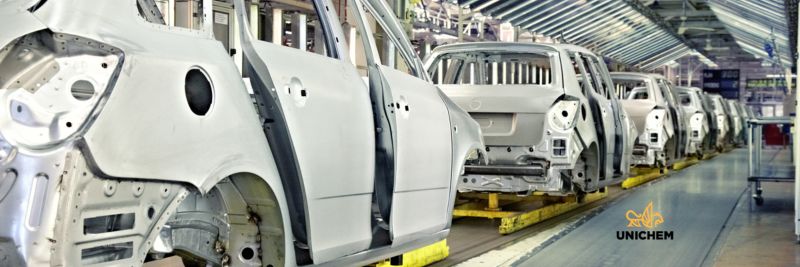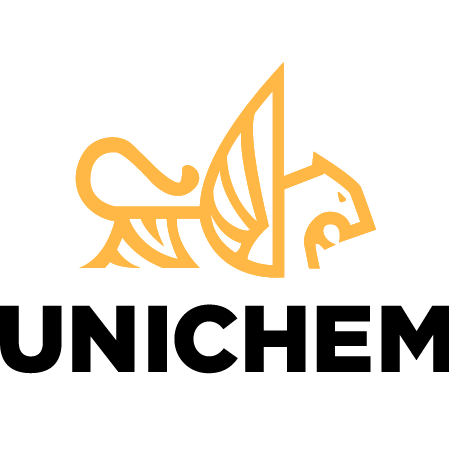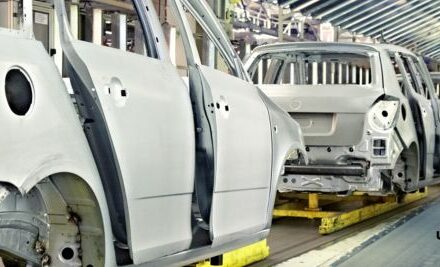 The automotive industry has evolved tremendously over the past few decades, with a strong focus on developing more efficient, durable, and lightweight vehicles. Adhesives play a critical role in achieving these goals, particularly in the use of metal or aluminum, laminated sandwich panels, which are now widely used in vehicle manufacturing. In transportation and building component industries, these composite structures combine layers of materials to form a lightweight yet sturdy panel, using coil-applied laminating adhesives to bond them together.
The automotive industry has evolved tremendously over the past few decades, with a strong focus on developing more efficient, durable, and lightweight vehicles. Adhesives play a critical role in achieving these goals, particularly in the use of metal or aluminum, laminated sandwich panels, which are now widely used in vehicle manufacturing. In transportation and building component industries, these composite structures combine layers of materials to form a lightweight yet sturdy panel, using coil-applied laminating adhesives to bond them together.
In modern vehicle manufacturing, adhesives provide a range of benefits, including weight reduction, enhanced strength, and improved thermal and sound insulation. Laminating adhesives used for bonding metal to metal, or metal to membranes, in transportation, contribute significantly to the vehicle’s structural integrity while maintaining lightweight properties—an essential factor for fuel efficiency, sound deadening, and other performance attributes, improving overall performance.
What Are Sandwich Panels?
Sandwich panels are multi-layered composite materials consisting of a lightweight core material, such as foam, sandwiched between two outer layers, usually metal, plastic, or composite skins. The core provides insulation and strength, while the outer layers offer rigidity and durability. In automotive manufacturing, sandwich panels are typically used for structural components like doors, roofs, floors, and interior panels.
The use of adhesives in sandwich panel construction ensures that these lightweight materials can be securely bonded to the metal structural component, maintaining the panel’s structural integrity under varying stress conditions. These panels help improve vehicle aerodynamics, reduce weight, and provide better soundproofing, making adhesives an indispensable solution in this market.
The Role of Adhesives in Vehicle Manufacturing
Adhesives are now a fundamental part of modern vehicle design. As vehicle manufacturers seek innovative ways to reduce weight and improve performance, sandwich panels have become popular, requiring strong adhesive solutions for proper bonding.
Key benefits of adhesives in sandwich panel bonding:
- Weight Reduction: Adhesives allow manufacturers to use lightweight materials in sandwich panels without compromising strength. This helps reduce the overall weight of the vehicle, improving fuel efficiency and lowering emissions.
- Durability: High-performance adhesives used in sandwich panels are designed to withstand extreme conditions, including temperature fluctuations, moisture, and mechanical stress. These properties make them ideal for both interior and exterior automotive applications.
- Improved Performance: Adhesives in sandwich panels enhance the vehicle’s structural performance by distributing stress more evenly across bonded surfaces. This ensures better durability and longevity.
- Flexibility: Adhesives provide flexibility in the design process, allowing manufacturers to experiment with various material combinations and achieve complex shapes or designs that are difficult with traditional joining methods like welding or riveting.
- Thermal and Acoustic Insulation: Sandwich panels bonded with adhesives offer excellent thermal and sound insulation properties, improving the comfort and efficiency of modern vehicles. Adhesives also ensure the seamless bonding of dissimilar materials, creating an effective barrier against heat and noise.
UNICHEM’s Laminating Adhesive Solutions for Sandwich Panels
UNICHEM provides laminating adhesive solutions specifically designed for sandwich panels used in automotive, and other transportation manufacturing processes. These adhesives are developed to meet the unique challenges of bonding dissimilar materials and maintaining performance under extreme conditions.
UNICHEM’s uniBOND adhesive line is a key component in the construction of sandwich panels for automotive and other transportation applications. These adhesives offer superior bonding strength, flexibility, and durability, making them ideal for a wide range of vehicle components, including:
- Doors and roof panels: Where lightweight construction and rigidity are critical.
- Floor panels: Providing enhanced insulation against road noise and thermal conditions.
- Interior panels: Where the aesthetic and functional quality of materials is essential.
UNICHEM’s adhesives are coil-applied, ensuring consistent quality and strong adhesion throughout the vehicle’s lifecycle.
Applications of Sandwich Panels in Automotive Manufacturing
Sandwich panels are used in various parts of the vehicle, such as the chassis, body panels, and interiors. Adhesive-bonded sandwich panels deliver several performance enhancements for automotive manufacturers, including:
- Lightweight Body Panels: Reducing the weight of body panels without sacrificing strength.
- Aesthetic Enhancements: The seamless bonding of sandwich panels allows for smoother surfaces and more streamlined designs.
Benefits of UNICHEM Adhesives in Automotive Manufacturing
UNICHEM’s coil-applied adhesives are specifically engineered to address the unique demands of vehicle manufacturing. Below are some key benefits of using UNICHEM’s laminating adhesive solutions for sandwich panel construction:
- Enhanced Structural Integrity: UNICHEM’s adhesives are formulated to offer high shear and peel strength, ensuring a robust bond between the sandwich panel layers.
- Corrosion Resistance: The adhesive layers act as a barrier against corrosion, essential for extending the lifespan of vehicle components, especially those exposed to environmental factors such as moisture, salt, and temperature variations.
- Sustainability: UNICHEM’s laminating adhesive solutions contribute to greener, coil coating manufacturing processes. Using coil-applied laminating adhesives for sandwich panels reduces the weight of vehicles, resulting in lower fuel consumption and emissions.
- Vibration Dampening: Adhesive-bonded sandwich panels help absorb road vibrations and noise, contributing to a smoother, quieter ride. This is particularly important in the design of electric vehicles (EVs), where noise reduction is crucial due to the lack of engine sounds.
Future Trends in Adhesive Technology for Vehicles
As the automotive industry moves towards electrification and sustainability, the demand for advanced laminating adhesive solutions is set to grow. Adhesives will continue to play a pivotal role in the development of lighter, more fuel-efficient, and environmentally friendly vehicles. Sandwich panels, bonded with high-performance adhesives, will likely be at the forefront of this transition.
UNICHEM is committed to advancing laminating adhesive technology, particularly for the electric vehicle market, where lightweight materials and improved thermal management are critical. The uniBOND adhesive line is well-positioned to meet the increasing demands of next-generation vehicle manufacturing.
Custom Adhesive Solutions
UNICHEM’s experience in developing innovative laminating adhesive solutions for vehicle manufacturing makes us the preferred partner for OEMs and automotive manufacturers. Contact us today to discuss your specific adhesive needs for sandwich panels and other vehicle components. Our team of adhesive experts can provide custom solutions that meet your performance and sustainability requirements.
UNICHEM has over 50 years of expertise in developing high-performance adhesives and coatings for automotive manufacturing, including bonding solutions for sandwich panels. We provide custom adhesive formulations designed for durability, corrosion resistance, and weight reduction in vehicle components. Contact UNICHEM today to learn more about how our innovative solutions can enhance your vehicle manufacturing processes.


